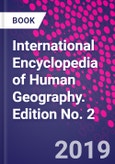International Encyclopedia of Human Geography, Second Edition, Fourteen Volume Set embraces diversity by design and captures the ways in which humans share places and view differences based on gender, race, nationality, location and other factors-in other words, the things that make people and places different. Questions of, for example, politics, economics, race relations and migration are introduced and discussed through a geographical lens. This updated edition will assist readers in their research by providing factual information, historical perspectives, theoretical approaches, reviews of literature, and provocative topical discussions that will stimulate creative thinking.
Please Note: This is an On Demand product, delivery may take up to 11 working days after payment has been received.
Table of Contents
The second edition contains approximately 800 articles which are structured around the following themes:
Cultural: Topics include: cultural geography; cultural theory; cultural studies; postcolonial geographies; indigenous geographies; education; ethnicity; geography and religion; geography and the humanities; geography and the media (film, print, creative industries); popular culture; more-than-human representations
Economic: Topics include: economic development; economic theories; spatial theories; urban economic geography; economic inequalities; housing; industrial geography; geographies of labor and job provision; transportation and communication; technology; world trade and trade policies; modernization and global economies; neoliberalism
Historical: Topics include: Landscape development; Historical representations/re-presentations/more-than-representations; Histories of the discipline; Historical geographies of political/conflict/border-making events; Historical GIS; Institutional historical geographies; Political economies; Colonialism and imperialism
Health: Topics include: health geography; medical geography; geographies of care; emotional geographies/geographies of mental health; therapeutic places; health care systems and institutions; healthcare policies; critical disability studies; epidemics and pandemics; international health aid; health and development; health and the built environment
Methods: Topics include: Cartography; methodology/paradigms; digital technologies; quantitative methods; qualitative methods; ethics and methods; surveys; GIS; participatory research
Nature/Society: Topics include: theories of nature; human/society and nature relations; climate change; natural disasters; energy issues; rural geographies; recreational geographies; non-human geographies; Anthropocene; environmental racism
Political/Philosophy: Topics include: Geopolitics; human rights; neoliberalism; political theory; international security; borders and boundaries; electoral geographies; public policy; governance; peace and conflict; politics of religion; political migration; international relations; international conventions; electoral geography
Population: Topics include: population growth and distribution; demographic change; digital technologies for population representation; migration; refugees; population and development; population and warfare/religion/governance; geographies of aging; globalization; racialization; gender
Social: Topics include: social relations; difference; multiculturalism; race and racism; feminist geographies; radical geographies; relevance and social issues; urban social geography; social theories; housing and social services
Urban: Topics include: What is urban?; urban historical geography; urban ecology; crime and policing; residential development, including segregation; urban models








